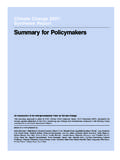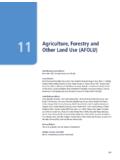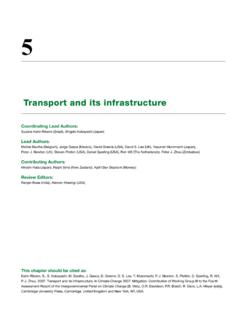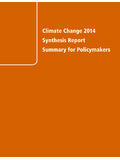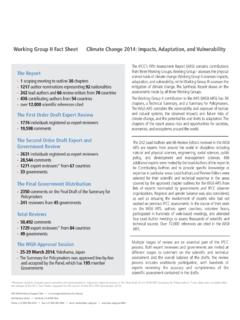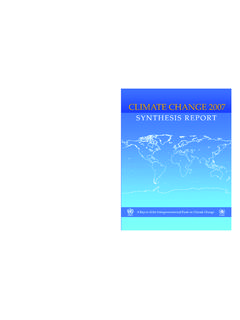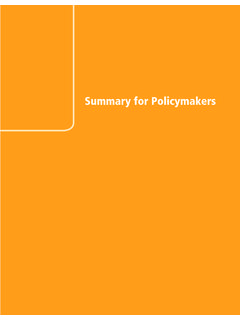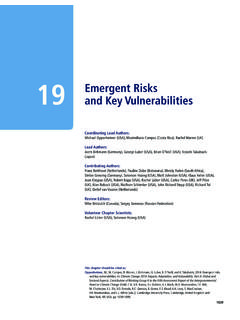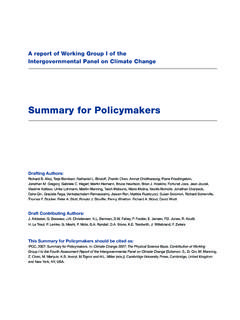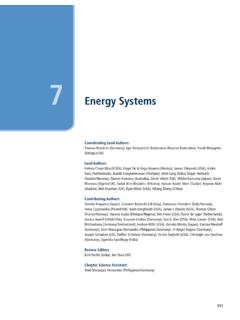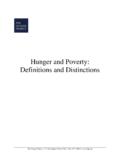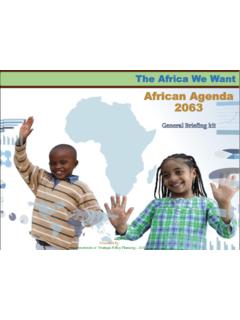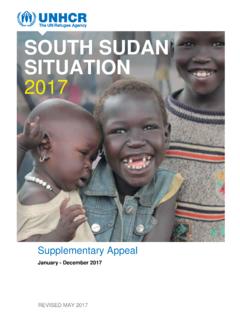Transcription of 22 — Africa - IPCC
1 119922 AfricaCoordinating Lead Authors:Isabelle Niang (Senegal), Oliver C. Ruppel (Namibia)Lead Authors:Mohamed A. Abdrabo (Egypt), Ama Essel (Ghana), Christopher Lennard (South Africa ),Jonathan Padgham (USA), Penny Urquhart (South Africa )Contributing Authors:Ibidun Adelekan (Nigeria), Sally Archibald (South Africa ), Michael Balinga (Cameroon),Armineh Barkhordarian (Germany), Jane Battersby (South Africa ), Eren Bilir (USA), Marshall Burke(USA), Mohammed Chahed (Tunisia), Monalisa Chatterjee (USA/India), Chineke Theo Chidiezie(Nigeria), Katrien Descheemaeker (Netherlands), Houria Djoudi (Algeria), Kristie L. Ebi (USA),Papa Demba Fall (Senegal), Ricardo Fuentes (Mexico), Rebecca Garland (South Africa ), Fatou Gaye(The Gambia), Karim Hilmi (Morocco), Emiloa Gbobaniyi (Nigeria), Patrick Gonzalez (USA),Blane Harvey (UK), Mary Hayden (USA), Andreas Hemp (Germany), Guy Jobbins (UK),Jennifer Johnson (USA), David Lobell (USA), Bruno Locatelli (France), Eva Ludi (UK), Lars Otto Naess(UK), Mzime R.
2 Ndebele-Murisa (Zimbabwe), Aminata Ndiaye (Senegal), Andrew Newsham (UK),Sirra Njai (The Gambia), Johnson Nkem (Cameroon), Jane Mukarugwiza Olwoch (South Africa ),Pieter Pauw (Netherlands), Emilia Pramova (Bulgaria), Marie-Louise Rakotondrafara (Madagascar),Clionadh Raleigh (Ireland), Debra Roberts (South Africa ), Carla Roncoli (USA), Aissa Toure Sarr(Senegal), Michael Henry Schleyer (South Africa ), Lena Schulte-Uebbing (Germany), Roland Schulze(South Africa ), Hussen Seid (Ethiopia), Sheona Shackleton (South Africa ), Mxolisi Shongwe(South Africa ), D ith Stone (Canada/South Africa /USA), David Thomas (UK), Okoro Ugochukwu(Nigeria), Dike Victor (Nigeria), Katharine Vincent (South Africa ), Koko Warner (Germany), Sidat Yaffa(The Gambia)Review Editors:Pauline Dube (Botswana), Neil Leary (USA)Volunteer Chapter Scientist:Lena Schulte-Uebbing (Germany)This chapter should be cited as:Niang, I.
3 , Ruppel, Abdrabo, A. Essel, C. Lennard, J. Padgham, and P. Urquhart, 2014: Africa . In: ClimateChange 2014: Impacts, Adaptation, and Vulnerability. Part B: Regional Aspects. Contribution of Working GroupII to the Fifth Assessment Report of the Intergovernmental Panel on Climate Change[Barros, , Field, Dokken, Mastrandrea, Mach, Bilir, M. Chatterjee, Ebi, Estrada, Genova, B. Girma, Kissel, Levy, S. MacCracken, Mastrandrea, and White (eds.)]. Cambridge University Press,Cambridge, United Kingdom and New York, NY, USA, pp. Introduction ..1205 Structure of the Regions ..1205 Major Conclusions from Previous Assessments ..1205 Regional Special Report and Assessment Reports ..1205 Special Report on Managing the Risks of Extreme Events and Disasters to Advance Climate Change Adaptation.
4 Observed Climate Trends and Future Projections ..1206 Temperature ..1206 Observed Trends ..1206 Projected Trends ..1206 Precipitation ..1209 Observed Changes ..1209 Projected Changes ..1210 Observed and Projected Changes in Extreme Temperature and Rainfall .. Vulnerability and Impacts ..1211 Socioeconomic and Environmental Context Influencing Vulnerability and Adaptive Capacity ..1211 Ecosystems ..1213 Terrestrial Ecosystems ..1213 Freshwater Ecosystems ..1215 Coastal and Ocean Systems ..1216 Water Resources ..1216 Agriculture and Food Security.
5 1218 Crops ..1218 Livestock ..1219 Agricultural Pests, Diseases, and Weeds ..1220 Fisheries ..1220 Food Security ..1221 Health ..1221 Introduction ..1221 Food- and Water-Borne Diseases ..1222 Nutrition ..1222 Vector-Borne Diseases and Other Climate-Sensitive Health Outcomes ..1222 Urbanization .. Adaptation ..1225 Introduction ..1225 Table of Contents22 Africa Chapter 221201 Adaptation Needs, Gaps, and Adaptive Capacity.
6 1226 Adaptation, Equity, and Sustainable Development ..1226 Experiences in Building the Governance System for Adaptation, and Lessons Learned ..1227 Introduction ..1227 Regional and National Adaptation Planning and Implementation ..1227 Institutional Frameworks for Adaptation ..1228 Subnational Adaptation Governance ..1228 Community-Based Adaptation and Local Institutions ..1229 Adaptation Decision Making and Monitoring ..1229 Experiences with Adaptation Measures in Africa and Lessons Learned ..1229 Overview ..1229 Climate Risk Reduction, Risk Transfer, and Livelihood Diversification.
7 1230 Box 22-1. Experience with Index-Based Weather Insurance in Africa ..1231 Adaptation as a Participatory Learning Process ..1231 Knowledge Development and Sharing ..1232 Communication, Education, and Capacity Development ..1233 Ecosystem Services, Biodiversity, and Natural Resource Management ..1233 Box 22-2. African Success Story: Integrating Trees into Annual Cropping Systems ..1233 Technological and Infrastructural Adaptation Responses ..1234 Maladaptation Risks ..1235 Barriers and Limits to Adaptation in Africa .. Key Risks for Africa .. Emerging Issues ..1238 Human Security.
8 1238 Violent Conflict ..1239 Migration ..1239 Integrated Adaptation/Mitigation Approaches ..1240 Biofuels and Land Use ..1240 Climate Finance and Management .. Research Gaps ..1242 References ..1243 Frequently Asked Questions : How could climate change impact food security in Africa ? ..1221 : What role does climate change play with regard to violent conflict in Africa ? ..123922 Chapter 22 Africa1202 Executive SummaryEvidence of warming over land regions across Africa , consistent with anthropogenic climate change, has increased (highconfidence).
9 Decadal analyses of temperatures strongly point to an increased warming trend across the continent over the last 50 to 100years. { }Mean annual temperature rise over Africa , relative to the late 20th century mean annual temperature, is likelyto exceed 2 C inthe Special Report on Emissions Scenarios (SRES) A1B and A2 scenarios by the end of this century (medium confidence). Warmingprojections under medium scenarios indicate that extensive areas of Africa will exceed 2 C by the last 2 decades of this century relative to thelate 20th century mean annual temperature and all of Africa under high emission scenarios. Under a high Representative Concentration Pathway(RCP), that exceedance could occur by mid-century across much of Africa and reach between 3 C and 6 C by the end of the century. It is likelythat land temperatures over Africa will rise faster than the global land average, particularly in the more arid regions, and that the rate of increasein minimum temperatures will exceed that of maximum temperatures.
10 { }A reduction in precipitation is likelyover Northern Africa and the southwestern parts of South Africa by the end of the 21stcentury under the SRES A1B and A2 scenarios (mediumto high confidence). Projected rainfall change over sub-Saharan Africa in themid- and late 21st century is uncertain. In regions of high or complex topography such as the Ethiopian Highlands, downscaled projectionsindicate likelyincreases in rainfall and extreme rainfall by the end of the 21st century. { , }African ecosystems are already being affected by climate change, and future impacts are expected to be substantial (highconfidence). There is emerging evidence on shifting ranges of some species and ecosystems due to elevated carbon dioxide (CO2) and climatechange, beyond the effects of land use change and other non-climate stressors (high confidence).
